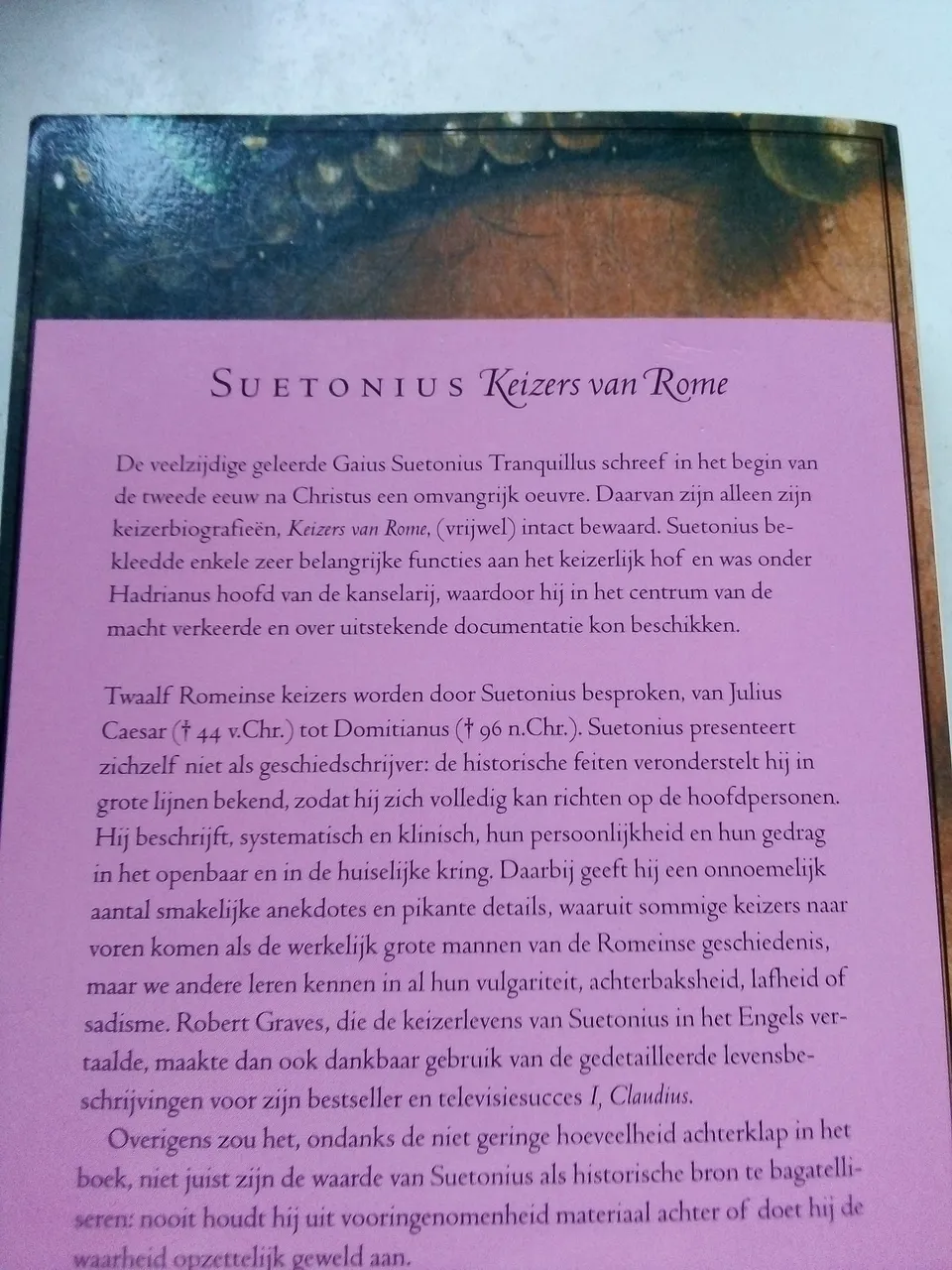
Good day Hivers and Book clubbers,
What's the definintion of an 'old book'? It can be interpreted in many ways. A dusty book with worn pages can seem old, yet only be from a few decades (or even years) ago. And a recent print can contain a very old text. We'll be looking at a case that clearly belongs in the second category.
I'll be talking about Suetonius's 'The Twelve Caesars', the Dutch translation that I acquired has translated the title to 'Emperors of Rome'. The original text was published in Latin in 121 A.D., and fortunately survived until our day. Other works of Suetonius were unfortunately not as lucky, and are probably lost forever.
Writing form
Before getting to some actual contents, I'd like to discuss some things about the way Suetonius has written this text as a historian. In the 21st century, writings on history have become very academic: widely sourced, a focus on objectivity (as an ideal at least, whether it can be achieved is very debatable) and a distrust of hearsay. Suetonius also uses sources in some cases, but seems to be reliant on hearsay as well for his character pieces.
One thing that I noticed from the start was the almost total lack of years used as dates. It sometimes refers to a certain year as 'the year that X and Y were consuls', which can only be deciphered today by using the internet to find out which year he actually meant. Suetonius expects these basic facts to be known to his reading audience, which is tough for readers today, almost two millennia later. Suetonius also talks a lot about the personal qualities of the emperors, something that often lacks in a more stale historical work which just treats the events.
My Dutch translation has made an effort to remain faithful to the original text, most noticeably in the sentence structuring. Latin senctences tend to be (overly) long, in which it can become unclear what exactly is meant, and to what and to whom the writer tries to refer. This uneasiness is carried over into the translations, which can make some sentences hard to interpret.
Julius Caesar
The first chapter deals with a man who, technically, was not a Roman emperor. Though the name Caesar has become synonymous with emperor in several languages (German: Kaiser, Russian: Csar etc.), his nephew Augustus would become the first emperor. Ceasar's power at his prime, however, was de facto that of being an emperor, i.e. dictator for life.
One of his main strenghts, according to Suetonius, was his way with (his) soldiers. He was very much able to inspire his men, and they stayed with him with absolute loyalty, even when Caesar went against the will of Rome itself (the famous Rubicon-moment). His position as people's tribune was a result of being well-liked by the plebeians (basically the non-slave lower/working class) He was not yet done with his reforms (think of the Julian calendar we use today) of the Roman state when he was stabbed 23 times by a group of his fellow senators. Suetonius posits that his now-famous 'et tu, Brute?' was not actually said. Suetonius's account is far less dramatic: Caesar said nothing at all.
Augustus
Julius Caesar did not have a direct heir to inherit the Empire. So he adopted his nephew, Gaius Octavius, as his heir, who became better known today as Augustus. Augustus might be the most well-known Roman emperor overall. Considered as a good commander and administrator, he was able to win the three-way civil war between himself, Marcus Antonius and Lepidus. The battle of Actium in 31 B.C. against Marcus Antonius cemented his position for good.
Suetonius, however, also points to his defeats. He was defeated twice at sea, in which he lost the majority of his ships. One of the most notorious defeats of the Roman Empire also happened under his reign. In the year 9 A.D. general Varus lost three whole legions in battle against Arminius (German: Hermann) and his confederation of German tribes. The defeat was so shocking that it caused riots in Rome, and Augustus was barely in control anymore. As an aside, this is probably the moment that 'saved' the Germanic peoples and their culture and languages from Roman influence. It's a defining moment in German history, although it is not taught that way today, unfortunately.
Suetonius also notes Augustus's eating and living habits, which were remarkably sober for a man of his wealth and stature. He lived in what could be considered a middle-class house at the time, and though his banquets were phenomenal, this was mostly in honor of his entourage, than his own appetite. He was noted to have eaten little, or forget to eat at all during an hours-long dinner occasion, and having to eat after everyone had left already. He was often ill, yet also long-lived: he died of natural causes at age 74, having reigned as emperor for 41 years.
To wrap things up
I've only noted the first two of the twelve empeorors here, for it's hard to do an almost 400-page book justice in a review that I try to keep somewhat concise. I do recommend this read to those interested in history: it's good to pick up a primary source once in a while, instead of the modern compilations and secondary books. The Romans knew the importance of writing things down very well, and it has done wonders for our understanding of European history overall. If only the Celts, Gauls and Germans at the time had written as much as the Romans, who knows how our view of the era would change. But history is written by the victors, especially when the victors are the only ones who have a habit of writing many things down. Until the next one,
-Pieter Nijmeijer
(Top image: my own)
